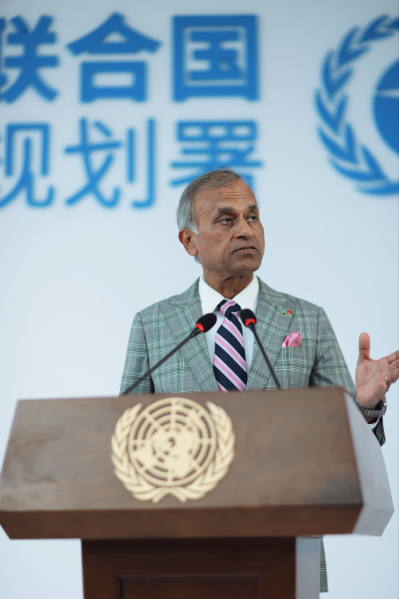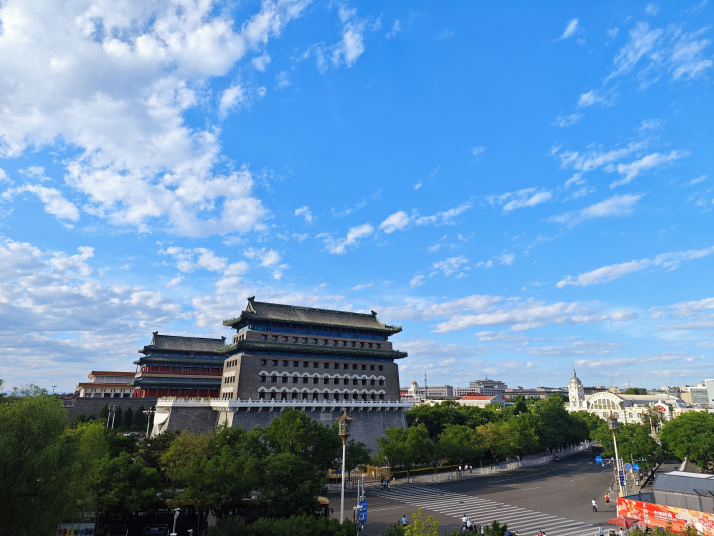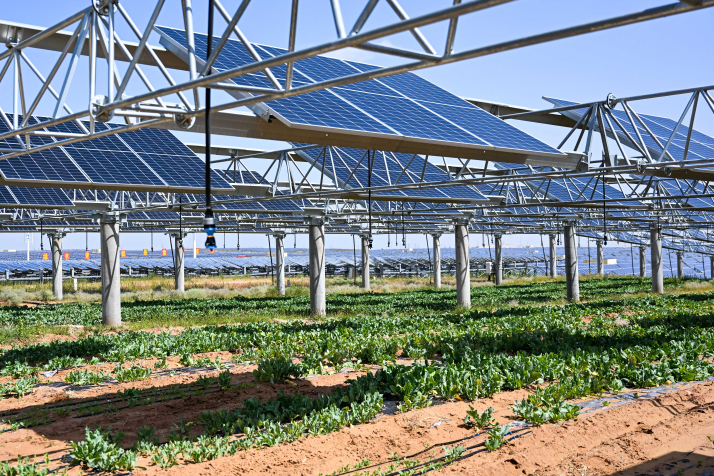| Voice |
| A UN perspective on China's path to eco-protection | |
|
|
 Siddharth Chatterjee, the United Nations Resident Coordinator in China, addresses an event organized by the UN Environment Programme China Office in Beijing on September 4, in the lead-up to the International Day of Clean Air for Blue Skies on September 7 (COURTESY PHOTO)
September 7 was the International Day of Clean Air for Blue Skies. Siddharth Chatterjee, the United Nations Resident Coordinator in China, spoke with Beijing Review reporter Li Nan on the sidelines of an event organized by the United Nations Environment Programme China Office to celebrate the day in Beijing on September 4. Edited excerpts from the interview follow: Beijing Review: What are your comments on China's environmental protection achievements? Siddharth Chatterjee: I think on all counts China must be commended for what it has done in dealing with nature. Look at Beijing, not just too long ago, about 20 to 25 years ago, it was one of the most polluted cities in the world leading to all forms of major human health challenges. Decades of determined efforts by the government, by communities and other stakeholders, have shown that cleaner air is within reach, as highlighted in the UN report and a review of 20 years of air pollution control in Beijing. And today its skies are clear with high air quality. And there are three reasons for this change. First, there was strong political will to make this change happen. Without political will that change does not happen. So I want to commend the leadership all the way from the top down to the municipal level for having taken this challenge as one that they could change. The second is how the government comes out with the right public policies to enable this sort of change to take place. So great public policies were put in place. And finally, it forged the right partnership—the partnership with society, partnership with the private sector, partnership with state-owned enterprises, partnership with the very companies that are polluting the place. It all came together to look at a common cause for a better environment for everybody. So Beijing stands out as a great model of success. Its journey offers valuable lessons for cities and countries everywhere seeking to clean up their skies. Now when I look across China, let's take the example of the Kubuqi Desert in Inner Mongolia Autonomous Region in north China. It used to send most of the sandstorms into Beijing. Today, that entire desert ecosystem has been turned into an agricultural wonderland and a renewable energy source which includes photovoltaic cells and windmills. Again, it is a result of a convergence of the right political will, right public policies and right partnerships. All this is a collective demonstration that to deal with the triple planetary crisis of biodiversity loss, climate change and air pollution, it needs concerted action. It needs the convergence of public-private partnerships. It needs political will. But, above all, what it needs is a desire for change that China on all counts has demonstrated.  The Qianmen area of Beijing under blue skies on May 31, 2024 (XINHUA)
What are your expectations for China's 15th Five-Year Plan (2026-30) in this area? Ecological governance is a very important issue President Xi Jinping has talked about. It is about harmony with social progress, harmony with people's development and harmony with nature. We need to bring all of it together. Without that, we will see the planet being robbed of its resources, the planet being completely exploited. And that is what we are seeing all over the world. That is why the race against fossil fuels and to embark on this journey for more renewable energy, more electric vehicles is so important. Today, if you go out onto the streets of Beijing, or many parts of China, many vehicles are electric—as a result of which air pollution has improved exponentially. Therefore, the concept of an ecological civilization should be applied throughout the world. It is very much ingrained in the UN Sustainable Development Goals. But, above all, I believe the Kunming-Montreal Global Biodiversity Framework is an excellent example of what is politically possible of bringing convergence around this issue. (The framework, adopted at the UN Biodiversity Conference in December 2022, aims to halt and reverse biodiversity loss by 2030—Ed.) In fact, I would say the Kunming Declaration is like the 2015 Paris Agreement on climate change. It is a very important step forward. I would encourage all countries across the world to embrace the Kunming-Montreal Global Biodiversity Framework as a call to action to deal with biodiversity loss. We must come together to deal with the challenges of climate change and air pollution. As China transits from the 14th Five-Year Plan (2021-25) to the 15th Five-Year Plan, it is an excellent model for how we can emphasize ecological civilization and how it can advance human development.  Crops growing beneath photovoltaic panels at an agricultural base in the Kubuqi Desert, Inner Mongolia Autonomous Region, on September 4 (XINHUA)
This year observes the 80th anniversary of the founding of the UN. How do you see China's role in this world body? The 80th anniversary is a very important milestone. It coincides with many important events that are already happening in China. UN Secretary General António Guterres has stated that the UN80 Initiative provides the UN with an opportunity to completely reform itself, which is what it is trying to do. ("In March 2025, Guterres launched the UN80 Initiative to transform how the UN works— identifying efficiencies, reviewing how mandates are implemented and examining potential structural changes and program realignment within the UN system," the official UN website reads—Ed.) I appreciate the strong support of China as a member state to advance and accelerate the UN80 Initiative. The UN80 Initiative is a beacon of hope. It also demonstrates that we've been able to avoid wars. We've been able to provide food and immunization under some of the most difficult circumstances, but the time has come for the UN to also change along with its membership. The UN80 Initiative is an important opportunity to do just that here, in China. We are already planning various events, including with the Shanghai Institute of International Studies, to look at the UN80 Initiative, look at the UN reforms, as well as advance our cooperation toward a big celebration on UN Day (October 24), where we expect to bring together over 150 ambassadors, bring together universities, senior officials from the Chinese Government, to mark this milestone. As Guterres said when he took over as UN secretary general in 2017, "The world isn't at peace. We need world peace." Today, we need world peace more than ever, with so many ongoing conflicts across the world. We are having a climate crisis. We had a pandemic that exposed the fragility of human health and the world's health system. It's a great opportunity for the world to unite behind the UN Sustainable Development Goals to advance humanity. BR Copyedited by Elsbeth van Paridon Comments to linan@cicgamericas.com |
|
||||||||||||||||||||||||||||||
|